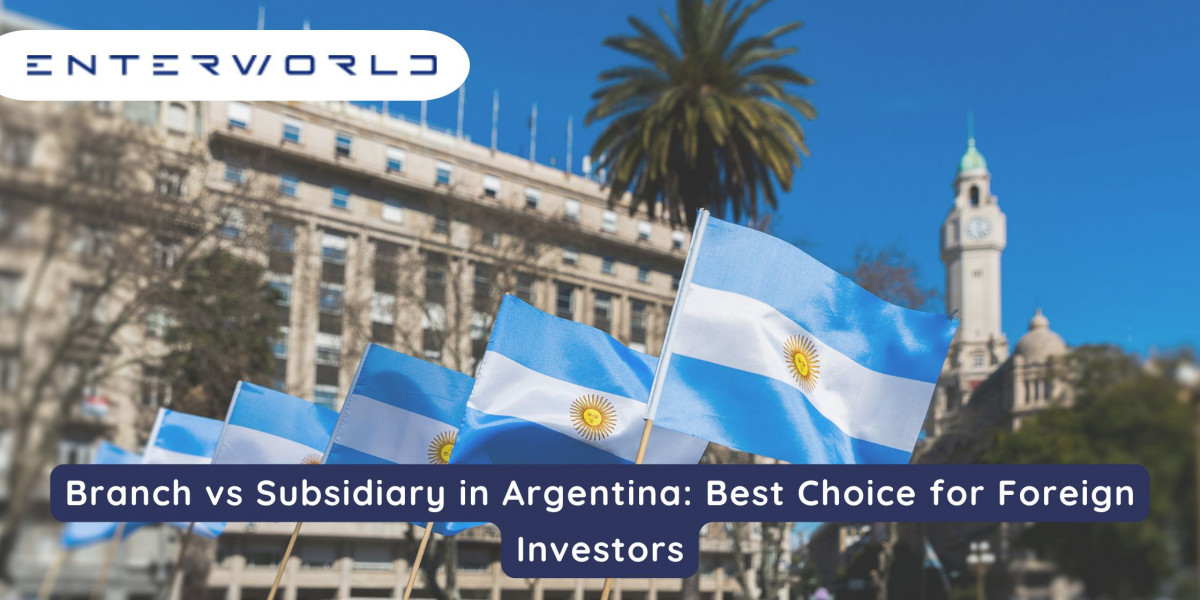Foreign investors looking to expand their business into Latin America often consider Argentina for its large consumer market, educated workforce, and strategic location. But when it comes to company registration in Argentina, one of the first and most important decisions is choosing the right legal structure. Should you open a branch office of your foreign company, or establish a subsidiary as a separate Argentine entity?
Both options are legally viable, but they come with very different regulatory, tax, and operational implications. In this guide, we’ll compare the two structures - branch vs subsidiary - to help you make the best choice for your business expansion in Argentina.
Understanding Company Registration in Argentina
Before comparing the two options, it’s important to understand the basic process of company registration in Argentina. Foreign companies can operate in the country through either:
A Sucursal (branch office)
A Subsidiaria (subsidiary), usually formed as an SRL (limited liability company) or SA (corporation)
Each structure has its own registration procedures, compliance obligations, and tax treatment. Choosing the right model depends on your business objectives, risk tolerance, and operational needs.
What is a Branch in Argentina?
A branch office in Argentina is an extension of the foreign parent company. It is not considered a separate legal entity but is fully dependent on the headquarters abroad.
Key Features of a Branch:
The foreign parent company is fully liable for the actions and obligations of the branch.
The branch must appoint a legal representative in Argentina.
Profits can be repatriated to the parent company without additional corporate structuring.
Financial statements of the parent must be submitted annually.
The branch must register with the Public Registry of Commerce and obtain a local tax ID (CUIT).
Advantages of a Branch:
Simpler reporting lines and centralized control
Faster setup compared to a subsidiary
No need to establish a new legal entity
Disadvantages of a Branch:
No legal separation from the parent company (unlimited liability)
Lower perception of permanence in the local market
Regulatory scrutiny of the foreign parent’s financials
A branch may be suitable for representative offices, liaison work, or limited activities where the foreign company wants to maintain tight control.
What is a Subsidiary in Argentina?
A subsidiary is a legally independent entity established under Argentine law. The most common forms are:
Sociedad de Responsabilidad Limitada (SRL) – similar to a limited liability company
Sociedad Anónima (SA) – equivalent to a corporation or joint-stock company
In either case, the subsidiary is registered in Argentina and governed by local corporate laws, even if wholly owned by a foreign company.
Key Features of a Subsidiary:
Separate legal identity from the parent company
Limited liability for the shareholders
Can operate independently in Argentina
Must keep its own accounting and file local financial statements
Subject to local taxation and labor laws
Advantages of a Subsidiary:
Legal and financial separation from the parent company
Better image as a local market player
Easier to partner with local clients, suppliers, and banks
More flexible for reinvesting profits in Argentina
Disadvantages of a Subsidiary:
More complex and time-consuming to set up
Requires local management and administrative overhead
Subject to local corporate governance obligations
A subsidiary is better suited for businesses planning a long-term presence in Argentina, with significant operational activities or a local customer base.
Company Registration Process in Argentina
Whether setting up a branch or subsidiary, company registration in Argentina follows a multi-step process, including:
Obtaining a CUIT (tax ID)
Registering with the Public Registry of Commerce
Appointing local representatives or directors
Opening a local bank account
Submitting company bylaws or parent company documentation
Registering with AFIP (Federal Tax Authority)
Enrolling in labor and social security systems (if hiring employees)
However, the exact requirements differ depending on the chosen structure.
Tax Implications: Branch vs Subsidiary
Branch Taxation:
Taxed as a permanent establishment of the foreign company
Subject to corporate income tax at the standard rate (currently 35%)
Profits remitted abroad are subject to a branch remittance tax of 7%
Subsidiary Taxation:
Treated as a domestic taxpayer
Also subject to corporate income tax at 35%
Dividends remitted to foreign shareholders may be subject to withholding tax
Eligible for tax treaties (depending on country of origin)
From a tax planning perspective, the decision often comes down to how profits are repatriated and the availability of treaty benefits under a holding structure.
Compliance and Reporting
Branches and subsidiaries have different ongoing obligations:
Branch:
Must submit the parent company’s audited financials (translated and legalized)
Annual branch financial statements must also be filed
Requires fewer internal governance structures
Subsidiary:
Must hold shareholder and board meetings per Argentine corporate law
Must file annual financial statements prepared under local accounting rules
Needs a registered address and at least one local director (SA)
If privacy, simplicity, or control are priorities, a branch may be easier to manage. However, for full operational autonomy, a subsidiary offers greater flexibility.
Reputation and Market Perception
A subsidiary typically signals a stronger commitment to the local market, which can help build trust with clients, partners, and regulators. It is viewed as a “local” company, even if foreign-owned.
By contrast, a branch may be perceived as temporary or limited in scope. In industries like banking, fintech, or consumer services, a local subsidiary often provides greater credibility.
Decision Factors: Which One Is Right for You?
Here’s a quick breakdown to help you choose the best structure:
| Factor | Branch | Subsidiary |
|---|---|---|
| Legal Separation | No | Yes |
| Parent Company Liability | Unlimited | Limited |
| Setup Speed | Faster | Slower |
| Administrative Burden | Lower | Higher |
| Local Image | Weaker | Stronger |
| Operational Flexibility | Limited | High |
| Tax Treaties | Limited access | Full access |
Choose a branch if:
You want to test the market before full commitment
You have a small team and limited operations
You need tight control from the parent company
Choose a subsidiary if:
You plan long-term operations in Argentina
You want to limit liability
You are entering into contracts with local clients or hiring staff
Conclusion
Deciding between a branch and a subsidiary is a strategic choice that impacts every aspect of your business — from legal liability and tax obligations to operations and branding. While both models allow for company registration in Argentina, the right choice depends on your long-term goals, industry, and tolerance for administrative complexity.
Foreign investors should consult with local legal and tax experts to fully evaluate both options before proceeding. With proper planning, Argentina can offer a valuable gateway to the Latin American market.
Frequently Asked Questions
1. Is it faster to open a branch or a subsidiary in Argentina?
Setting up a branch is usually quicker, as it involves fewer formalities. However, it may offer less flexibility and protection in the long term.
2. Can a subsidiary in Argentina be 100% foreign-owned?
Yes, there are no restrictions on foreign ownership. A subsidiary can be entirely owned by a foreign company or investor.
3. Are subsidiaries in Argentina eligible for tax treaties?
Yes, subsidiaries are considered domestic taxpayers and can benefit from applicable double taxation treaties that Argentina has signed with other countries.













